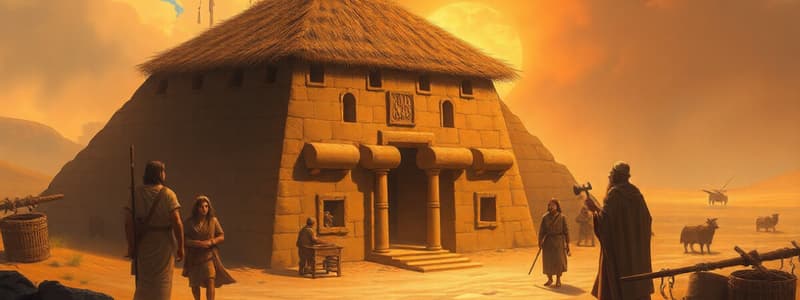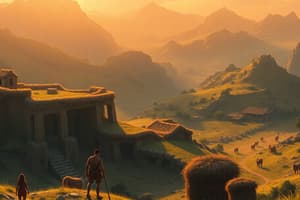Podcast
Questions and Answers
When we think of our most distant ancestors, we often think of ______.
When we think of our most distant ancestors, we often think of ______.
primitivity
Mainstream historical narratives often depict early humans as living a ______ way of life.
Mainstream historical narratives often depict early humans as living a ______ way of life.
stagnant
The earliest writing systems appeared some ______ years before present.
The earliest writing systems appeared some ______ years before present.
5,000
Humans lived a lifestyle as hunters and gatherers for hundreds of thousands of years, always moving across the land and living in small, closely knit ______.
Humans lived a lifestyle as hunters and gatherers for hundreds of thousands of years, always moving across the land and living in small, closely knit ______.
The beginning of the ______ Revolution was roughly 12-11,000 years ago.
The beginning of the ______ Revolution was roughly 12-11,000 years ago.
The life of these early humans was simple, but that does not mean it wasn't ______.
The life of these early humans was simple, but that does not mean it wasn't ______.
The understanding of the word 'advanced' today may ______ our view of prehistoric humans.
The understanding of the word 'advanced' today may ______ our view of prehistoric humans.
Technologies such as agriculture, animal husbandry, and writing were ushered in by ______ humans.
Technologies such as agriculture, animal husbandry, and writing were ushered in by ______ humans.
Modern historiography often puts prehistoric humans into a ______ and unflattering light.
Modern historiography often puts prehistoric humans into a ______ and unflattering light.
Evidence suggests that prehistoric humans may have been more ______ than we are led to believe.
Evidence suggests that prehistoric humans may have been more ______ than we are led to believe.
Early humans advanced in social organization and adapting to their ______.
Early humans advanced in social organization and adapting to their ______.
The ancient skill of navigation implies a certain understanding of ______.
The ancient skill of navigation implies a certain understanding of ______.
Scholars believe that Australia was colonized around ______ years ago.
Scholars believe that Australia was colonized around ______ years ago.
The existence of the Jade Road in modern-day China suggests the presence of prehistoric ______.
The existence of the Jade Road in modern-day China suggests the presence of prehistoric ______.
Ancient humans had knowledge about celestial bodies and advanced ______.
Ancient humans had knowledge about celestial bodies and advanced ______.
The Ishango bone is associated with primitive ______ calculations.
The Ishango bone is associated with primitive ______ calculations.
Women in prehistory may have used the Lebombo bone for tracking ______ phases.
Women in prehistory may have used the Lebombo bone for tracking ______ phases.
Many archaeological discoveries suggest that ancient peoples were ______ than previously thought.
Many archaeological discoveries suggest that ancient peoples were ______ than previously thought.
To truly understand prehistoric peoples, we need to reconsider the definition of what it means to be ______.
To truly understand prehistoric peoples, we need to reconsider the definition of what it means to be ______.
The observations of ancient humans about nature show they were at peace with their ______.
The observations of ancient humans about nature show they were at peace with their ______.
Study Notes
Prehistory: A Reassessment
- Prehistoric humans were more advanced than commonly thought.
- Modern historiography often portrays early humans as primitive, technologically stagnant, and unevolved.
- However, new evidence suggests a more nuanced view.
- Earliest writing systems appeared about 5,000 years ago, but humans existed for hundreds of thousands of years prior as hunters and gatherers.
- The Neolithic Revolution, around 12-11,000 years ago, ushered in complex societies, agriculture, and cities.
- Early humans were advanced in social organization, adaptation to their environment, tool creation, and hunting tactics.
- Ancient humans were skilled navigators, evidenced by early colonization of Australia (65,000 years ago) and Pacific islands.
- This suggests pre-historic societies had a rudimentary understanding of oceanic navigation.
- Prehistoric trade routes existed, exemplified by the Jade Road in China.
- Burial sites with luxury items from faraway places indicate long-distance trade networks.
- Ancient humans had a deep understanding of astronomy and mathematics.
- Megalithic structures like Stonehenge and Nabta Playa demonstrate knowledge of celestial movements.
- The Ishango bone (20,000 years old) and Lebombo bone (40,000 years old) are evidence of early mathematical calculations and understanding of lunar phases.
- These artifacts challenge the view that mathematics emerged only in the first civilizations.
- The simplistic lives of early humans should not be equated with primitiveness.
- Their connection with nature and adaptability were advanced forms of human existence.
- Rethinking prehistory requires a broader definition of "advanced", recognizing the intellectual and cultural achievements of early humans.
Studying That Suits You
Use AI to generate personalized quizzes and flashcards to suit your learning preferences.
Description
Explore the advancements of prehistoric humans beyond traditional views. This quiz examines evidence of early social organization, tool creation, and navigation skills, challenging common perceptions of primitive societies. Discover how the Neolithic Revolution transformed human life and the implications of early trade routes.




